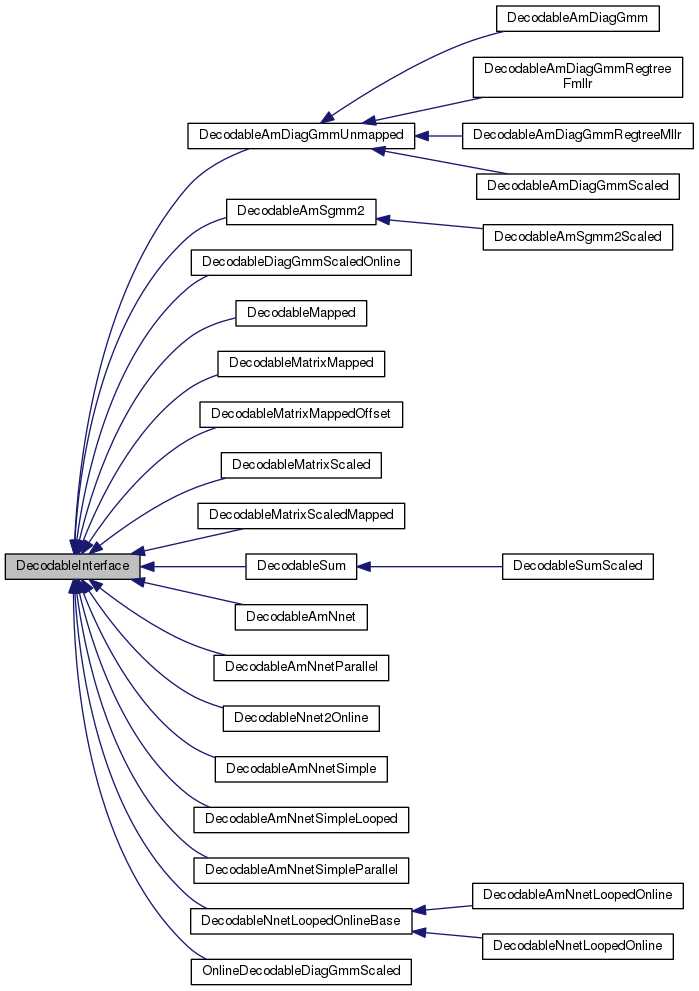DecodableInterface provides a link between the (acoustic-modeling and feature-processing) code and the decoder. More...
#include <decodable-itf.h>

Public Member Functions | |
| virtual BaseFloat | LogLikelihood (int32 frame, int32 index)=0 |
| Returns the log likelihood, which will be negated in the decoder. More... | |
| virtual bool | IsLastFrame (int32 frame) const =0 |
| Returns true if this is the last frame. More... | |
| virtual int32 | NumFramesReady () const |
| The call NumFramesReady() will return the number of frames currently available for this decodable object. More... | |
| virtual int32 | NumIndices () const =0 |
| Returns the number of states in the acoustic model (they will be indexed one-based, i.e. More... | |
| virtual | ~DecodableInterface () |
DecodableInterface provides a link between the (acoustic-modeling and feature-processing) code and the decoder.
The idea is to make this interface as small as possible, and to make it as agnostic as possible about the form of the acoustic model (e.g. don't assume the probabilities are a function of just a vector of floats), and about the decoder (e.g. don't assume it accesses frames in strict left-to-right order). For normal models, without on-line operation, the "decodable" sub-class will just be a wrapper around a matrix of features and an acoustic model, and it will answer the question 'what is the acoustic likelihood for this index and this frame?'.
For online decoding, where the features are coming in in real time, it is important to understand the IsLastFrame() and NumFramesReady() functions. There are two ways these are used: the old online-decoding code, in ../online/, and the new online-decoding code, in ../online2/. In the old online-decoding code, the decoder would do:
and the call to IsLastFrame would block if the features had not arrived yet. The decodable object would have to know when to terminate the decoding. This online-decoding mode is still supported, it is what happens when you call, for example, LatticeFasterDecoder::Decode().
We realized that this "blocking" mode of decoding is not very convenient because it forces the program to be multi-threaded and makes it complex to control endpointing. In the "new" decoding code, you don't call (for example) LatticeFasterDecoder::Decode(), you call LatticeFasterDecoder::InitDecoding(), and then each time you get more features, you provide them to the decodable object, and you call LatticeFasterDecoder::AdvanceDecoding(), which does something like this:
So the decodable object never has IsLastFrame() called. For decoding where you are starting with a matrix of features, the NumFramesReady() function will always just return the number of frames in the file, and IsLastFrame() will return true for the last frame.
For truly online decoding, the "old" online decodable objects in ../online/ have a "blocking" IsLastFrame() and will crash if you call NumFramesReady(). The "new" online decodable objects in ../online2/ return the number of frames currently accessible if you call NumFramesReady(). You will likely not need to call IsLastFrame(), but we implement it to only return true for the last frame of the file once we've decided to terminate decoding.
Definition at line 82 of file decodable-itf.h.
|
inlinevirtual |
Definition at line 117 of file decodable-itf.h.
Returns true if this is the last frame.
Frames are zero-based, so the first frame is zero. IsLastFrame(-1) will return false, unless the file is empty (which is a case that I'm not sure all the code will handle, so be careful). Caution: the behavior of this function in an online setting is being changed somewhat. In future it may return false in cases where we haven't yet decided to terminate decoding, but later true if we decide to terminate decoding. The plan in future is to rely more on NumFramesReady(), and in future, IsLastFrame() would always return false in an online-decoding setting, and would only return true in a decoding-from-matrix setting where we want to allow the last delta or LDA features to be flushed out for compatibility with the baseline setup.
Implemented in DecodableAmNnetSimpleParallel, DecodableAmNnetSimple, DecodableAmNnetSimpleLooped, DecodableMatrixScaled, DecodableMatrixMappedOffset, DecodableAmNnetParallel, DecodableMatrixMapped, DecodableAmNnet, DecodableNnet2Online, DecodableSum, DecodableAmSgmm2, DecodableNnetLoopedOnlineBase, DecodableAmDiagGmmUnmapped, DecodableMatrixScaledMapped, DecodableMapped, OnlineDecodableDiagGmmScaled, and DecodableDiagGmmScaledOnline.
Referenced by LatticeBiglmFasterDecoder::Decode(), BiglmFasterDecoder::Decode(), OnlineFasterDecoder::Decode(), LatticeSimpleDecoder::Decode(), LatticeIncrementalDecoderTpl< FST, decoder::BackpointerToken >::Decode(), DecodableMapped::IsLastFrame(), kaldi::RescoreCompactLatticeInternal(), and kaldi::RescoreLattice().
Returns the log likelihood, which will be negated in the decoder.
The "frame" starts from zero. You should verify that NumFramesReady() > frame before calling this.
Implemented in DecodableAmNnetSimpleParallel, DecodableAmNnetSimple, DecodableAmNnetSimpleLooped, DecodableMatrixScaled, DecodableAmNnetLoopedOnline, DecodableMatrixMappedOffset, DecodableNnetLoopedOnline, DecodableAmDiagGmmScaled, DecodableAmNnetParallel, DecodableAmSgmm2Scaled, DecodableMatrixMapped, DecodableAmDiagGmm, DecodableSumScaled, DecodableAmDiagGmmRegtreeMllr, DecodableAmNnet, DecodableNnet2Online, DecodableMatrixScaledMapped, DecodableAmSgmm2, DecodableSum, DecodableAmDiagGmmUnmapped, DecodableAmDiagGmmRegtreeFmllr, OnlineDecodableDiagGmmScaled, DecodableDiagGmmScaledOnline, and DecodableMapped.
Referenced by DecodableMapped::LogLikelihood(), DecodableNnetLoopedOnline::NumIndices(), DecodableAmNnetLoopedOnline::NumIndices(), SimpleDecoder::ProcessEmitting(), FasterDecoder::ProcessEmitting(), LatticeSimpleDecoder::ProcessEmitting(), BiglmFasterDecoder::ProcessEmitting(), LatticeFasterDecoderTpl< fst::StdFst, decoder::BackpointerToken >::ProcessEmitting(), LatticeIncrementalDecoderTpl< FST, decoder::BackpointerToken >::ProcessEmitting(), LatticeBiglmFasterDecoder::ProcessEmitting(), kaldi::RescoreCompactLatticeInternal(), and kaldi::RescoreLattice().
|
inlinevirtual |
The call NumFramesReady() will return the number of frames currently available for this decodable object.
This is for use in setups where you don't want the decoder to block while waiting for input. This is newly added as of Jan 2014, and I hope, going forward, to rely on this mechanism more than IsLastFrame to know when to stop decoding.
Reimplemented in DecodableAmNnetSimpleParallel, DecodableAmNnetSimple, DecodableAmNnetSimpleLooped, DecodableMatrixScaled, DecodableMatrixMappedOffset, DecodableAmNnetParallel, DecodableMatrixMapped, DecodableAmDiagGmmRegtreeMllr, DecodableAmNnet, DecodableNnet2Online, DecodableNnetLoopedOnlineBase, DecodableAmSgmm2, DecodableAmDiagGmmUnmapped, DecodableMatrixScaledMapped, DecodableAmDiagGmmRegtreeFmllr, and DecodableDiagGmmScaledOnline.
Definition at line 107 of file decodable-itf.h.
References KALDI_ERR, and DecodableInterface::NumIndices().
Referenced by SimpleDecoder::AdvanceDecoding(), FasterDecoder::AdvanceDecoding(), LatticeFasterDecoderTpl< fst::StdFst, decoder::BackpointerToken >::AdvanceDecoding(), LatticeIncrementalDecoderTpl< FST, decoder::BackpointerToken >::AdvanceDecoding(), and kaldi::AlignUtteranceWrapper().
|
pure virtual |
Returns the number of states in the acoustic model (they will be indexed one-based, i.e.
from 1 to NumIndices(); this is for compatibility with OpenFst).
Implemented in DecodableAmNnetSimpleParallel, DecodableAmNnetSimple, DecodableAmNnetSimpleLooped, DecodableMatrixScaled, DecodableAmNnetLoopedOnline, DecodableMatrixMappedOffset, DecodableNnetLoopedOnline, DecodableAmNnetParallel, DecodableAmDiagGmmScaled, DecodableMatrixMapped, DecodableAmDiagGmm, DecodableAmDiagGmmRegtreeMllr, DecodableAmNnet, DecodableNnet2Online, DecodableSum, DecodableMatrixScaledMapped, DecodableAmSgmm2, DecodableAmDiagGmmUnmapped, DecodableAmDiagGmmRegtreeFmllr, DecodableDiagGmmScaledOnline, DecodableMapped, and OnlineDecodableDiagGmmScaled.
Referenced by DecodableInterface::NumFramesReady().